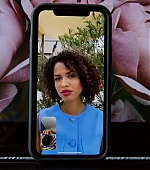



Friends Gugu Mbatha-Raw MBE and Amma Asante MBE first worked together on the acclaimed and multi-award-winning, 2013 period drama film Belle, which Asante directed and Mbatha-Raw starred in as Dido Elizabeth Belle. Dubbed Britain’s ‘first Black aristocrat’, Belle was the mixed race, illegitimate daughter of a naval officer, Sir John Lindsay, and an enslaved African woman named Maria Bell. In 1772, Belle’s great-uncle, Lord Mansfield, in his capacity as Lord Chief Justice, ruled that slavery had no precedent in common law in England. The film’s themes feel particularly pertinent in this politically charged climate, which saw a statue of 17th-century slave trader, Edward Colston, toppled in Bristol at the height of the Black Lives Matter protests in the UK.
Since then, Mbatha-Raw has forged a critically lauded career built on championing strong, Black female narratives. She starred in the first-ever $100m film to be helmed by an African-American woman, Ava DuVernay’s Wrinkle In Time in 2018. She also portrayed the first Black Miss World – Jennifer Hosten, ‘Miss Grenada’ – in Misbehaviour, and received much awards attention for the Apple TV+ hit, The Morning Show. Now, Mbatha-Raw is set to release World War II movie Summerland by Olivier Award-winning playwright, Jessica Swale, as well as the Marvel series Loki, alongside Tom Hiddleston.
Although other upcoming projects may have taken a hiatus due to COVID-19, Mbatha-Raw has been spending her enforced period of inactivity avidly supporting the Black Lives Matter movement. Via the Instagram-based venture, Still We Rise, she has been auctioning her own artworks of two African Americans who tragically lost their lives to police violence, George Floyd and Breonna Taylor. Proceeds go to charities that support social justice, including Black Lives Matter, Equal Justice Initiative, Movement for Black Lives and the Bail Project.
Ahead of the release of Summerland, the Black British powerhouses – Mbatha-Raw in LA and Asante in Denmark – caught up during the last few days of lockdown. Their frank and personal conversation encompasses protests, Britain’s past and, at this very necessary junction, their prescient hopes for the future.
Gugu Mbatha-Raw: ‘When I saw the statue of Edward Colston being pulled down, I was thinking, “My gosh, if Belle was to come out now, would it be received in a different way?”’
Amma Asante: ‘I sincerely think it would be received in a way that it should have in the first place. The film was about love in so many ways, but it was actually also asking some very powerful questions about today. When I saw that statue being pulled down, I unfortunately couldn’t hide my excitement on social media. My delight was evident.’
GMR: ‘I don’t agree with the statues being glorified, obviously. But I also think that we can’t erase the past. I think you have to be able to know the scars of history to learn from it. If there hadn’t been a painting of Belle, then we wouldn’t have known about her.’
AA: ‘That was the evidence of who she was.’
GMR: ‘And we still need the evidence – we can’t erase all the negative, and then it just disappears and we forget what happened.’
AA: ‘I think we should put them where they belong, which is in museums. Once these relics are put in museums, then more nuanced conversations can occur. If you are Black, walking through your town centre and your four-year-old daughter says, “Who’s he? Why is he up there?”, how do you explain it?’
GMR: ‘There’s no context. I think that’s the thing about at least putting it in a museum.’
AA: ‘It’s so important to how we understand who we are. To own who we have been is the only way to truly be able to celebrate the things that are worth celebrating and change the things that weren’t. I hope that is where the conversations will land us.’ [More at Source]